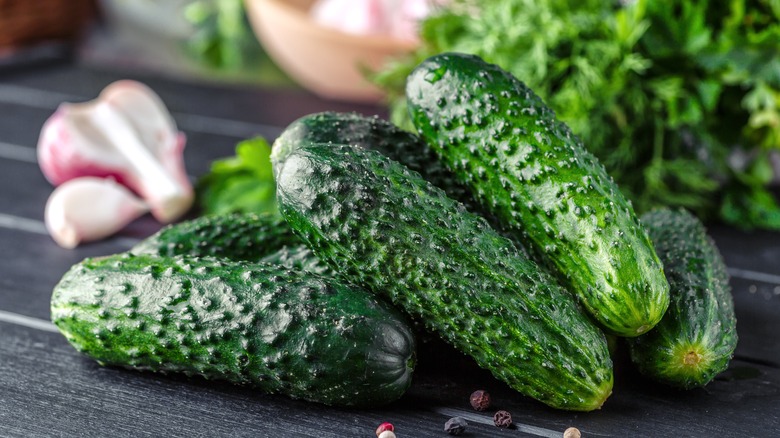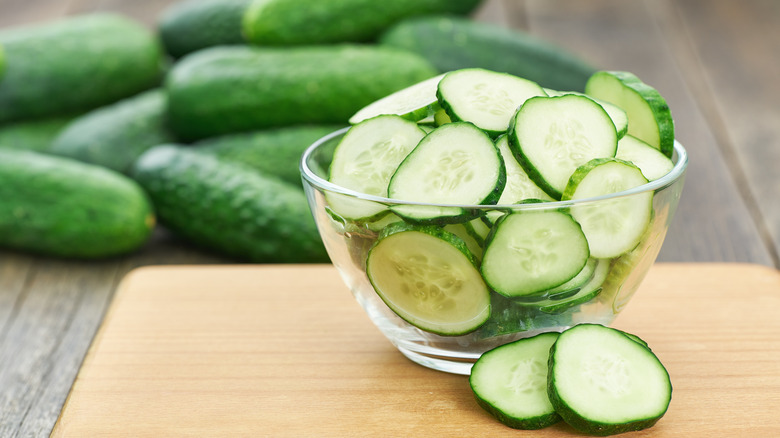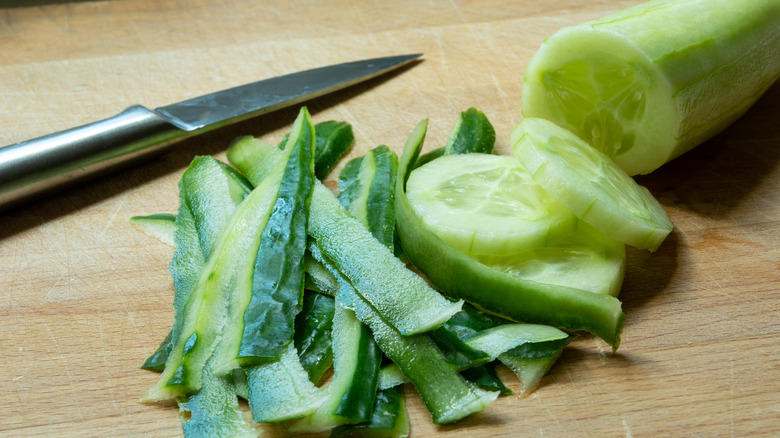If Your Cucumbers Are Bitter, Try 'Milking' Them
Your average cucumber may not look like much to write home about, but this long, green vegetable is surprisingly versatile. The most obvious use for cucumbers, outside of being used in summer salads, is to make homemade pickles – a process that involves soaking cucumbers in your choice of salty, sweet, or spicy brine. If you've ever been in a ritzy hotel or a fancy restaurant, you may notice that, alongside the usual lemon water, you can find "cucumber water." While this combination may sound odd, Medical News Today tells us that cucumber water may help promote weight loss, and skin health, and is a prime source of antioxidants alongside the usual benefits of water.
It's not just salads and water that cucumber has its uses in. If you were to ever imagine a stereotypical spa, you'd probably imagine someone with their face plastered in a white face mask and the odd addition of cucumbers on their eyes. The reason for cucumbers being included in these types of treatments is, according to Healthline, their high water content not only helps to refresh and moisturize the area, but the cucumber's vitamin C content can rejuvenate dead skin cells and promote cell growth.
But despite all of the cucumber's benefits, you may find that some have a very bitter, unpleasant taste. You might be shocked to learn you can do something to get that well-known crisp and refreshing flavor from your cucumber.
What is milking a cucumber?
You can milk a cucumber to revive its refreshing flavor. This requires very little effort on your part, sparing you the impossibly Herculean task of squeezing a cucumber dry.
According to TikTok user @basicallyperkfect, this is a trick that she had learned from her sister-in-law, who in turn had learned it from her boyfriend (who learned it from his grandfather). To "milk" a cucumber, you must first slice the pointed tip of the cucumber off, but not discard it. Place the tip back onto the cucumber and then quickly rub it around the top in circular motions. As you do this, you'll notice a milky-white "cheese"-like substance begin to form around the edge of the whole cucumber. But what is this white pasty substance and what does it have to do with the bitter taste of a cucumber?
Blue Apron's vice president of culinary operations, John Adler, explains to TODAY that this substance is known as "cucurbitacin," a compound found in many, but not all, varieties of cucumber. Cucurbitacin is what gives some cucumbers that somewhat bitter taste and is usually concentrated in the tips of cucumbers. This is why you have to remove the tip before "milking" them, as the tip contains the most cucurbitacin.
How else can you remove bitterness from a cucumber?
While milking a cucumber is a good way to get the bitterness out, maybe you're just not sold on the idea. What are some other good ways that you can remove the bitterness from your cucumbers and get that crisp, clean taste you're looking for without using the milking process?
According to Slurrp, all you need to "purify" a cucumber's bitter taste is a bit of salt. Simply slice the ends of the cucumbers off and then sprinkle salt on the cucumber's exposed flesh. The salt will draw out the cucurbitacin through the process of osmosis, leading to the cucumber leaking that thick white fluid the same way milking would achieve.
Another useful trick would be to peel the cucumber using "fork furrowing." Sweetish Hill explains that this involves taking a fork and scraping its tines up and down the sides of the cucumber until it is covered in grooves, or "furrows." This is said to help release the cucurbitacin in the cucumber, which escapes through the furrows made in the flesh. Repeat this process twice over and then wash the cucumber thoroughly in the sink.
Whether or not you remove the bitterness from your cucumbers, you can still use the cucumbers in a wide variety of dishes, such as cucumber and tomato soup or lamb chops with cucumber and dill sauce.


